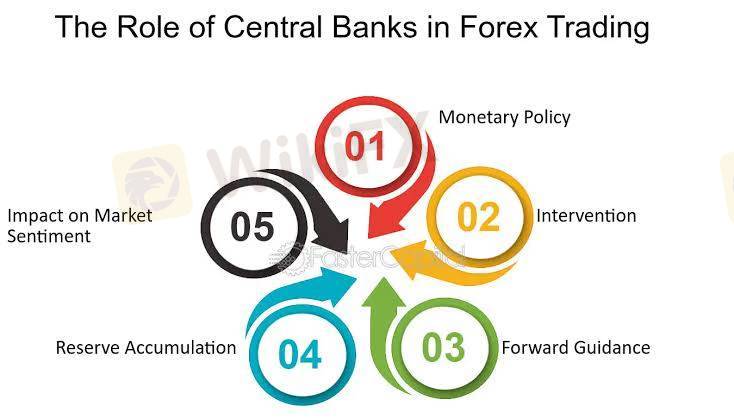
2025-02-12 20:28
A l'instar de l'industrieThe impact of central bank policy on forex market
#firstdealofthenewyearastylz
The Impact of Central Bank Policy on Forex Market
Introduction
The foreign exchange (forex) market is a dynamic and highly volatile environment, influenced by a multitude of factors. Among these, central bank policy plays a crucial role in shaping the market's trajectory. Central banks, responsible for managing a nation's monetary policy, implement decisions that significantly impact currency values, trading volumes, and market sentiment.
Monetary Policy Tools
Central banks employ various monetary policy tools to achieve their objectives, including:
1. *Interest Rates*: Adjusting interest rates influences borrowing costs, consumption, and investment, ultimately affecting currency demand and value.
2. *Quantitative Easing (QE)*: Central banks create new money to purchase assets, injecting liquidity into the economy and influencing currency values.
3. *Forward Guidance*: Communicating future policy intentions helps shape market expectations, influencing currency prices.
Impact on Forex Market
Central bank policy decisions have far-reaching consequences for the forex market:
1. *Currency Volatility*: Changes in interest rates, QE, or forward guidance can lead to significant currency fluctuations, creating opportunities and challenges for traders.
2. *Currency Strength*: A central bank's decision to raise interest rates or implement hawkish policies can strengthen its currency, while dovish policies can weaken it.
3. *Trade Volumes*: Central bank policy announcements can increase trading volumes, as market participants react to new information and adjust their positions.
4. *Market Sentiment*: Central bank communication can influence market sentiment, with hawkish or dovish tones impacting investor confidence and risk appetite.
Examples and Case Studies
1. *Federal Reserve (Fed)*: The Fed's decision to raise interest rates in 2015 strengthened the US dollar, while its subsequent rate cuts in 2020 weakened the currency.
2. *European Central Bank (ECB)*: The ECB's implementation of QE in 2015 boosted the eurozone economy but weakened the euro currency.
3. *Bank of Japan (BoJ)*: The BoJ's adoption of negative interest rates in 2016 aimed to stimulate the Japanese economy but had limited impact on the yen currency.
Conclusion
Central bank policy has a profound impact on the forex market, influencing currency values, trading volumes, and market sentiment. Understanding central bank decisions and communication is crucial for traders, investors, and policymakers to navigate the complex and dynamic forex market. By analyzing central bank policy, market participants can make informed decisions, manage risk, and capitalize on opportunities in the ever-changing forex landscape.
J'aime 0

Vic.d
Sàn giao dịch
Discussions recherchées
A l'instar de l'industrie
WikiFX recrute: Un(e) spécialiste e-marketing Forex à temps partiel
A l'instar de l'industrie
Tirages au sort WikiFX - Tentez votre chance pour gagner un crédit d’appel !
A l'instar de l'industrie
WikiFX recrute un(e) spécialiste marketing
A l'instar de l'industrie
Chemin à la fortune : Indications de l'activité Airdrop WikiBit
Analyse de marché
construction
A l'instar de l'industrie
Route à la Fortune : Indications de l'activité Airdrop Spécial WikiBit
Catégorisation des marchés

Plateformes

Signalement

Agents

Recrutement

EA

A l'instar de l'industrie

Marché

Indicateur
The impact of central bank policy on forex market
 Hong Kong | 2025-02-12 20:28
Hong Kong | 2025-02-12 20:28#firstdealofthenewyearastylz
The Impact of Central Bank Policy on Forex Market
Introduction
The foreign exchange (forex) market is a dynamic and highly volatile environment, influenced by a multitude of factors. Among these, central bank policy plays a crucial role in shaping the market's trajectory. Central banks, responsible for managing a nation's monetary policy, implement decisions that significantly impact currency values, trading volumes, and market sentiment.
Monetary Policy Tools
Central banks employ various monetary policy tools to achieve their objectives, including:
1. *Interest Rates*: Adjusting interest rates influences borrowing costs, consumption, and investment, ultimately affecting currency demand and value.
2. *Quantitative Easing (QE)*: Central banks create new money to purchase assets, injecting liquidity into the economy and influencing currency values.
3. *Forward Guidance*: Communicating future policy intentions helps shape market expectations, influencing currency prices.
Impact on Forex Market
Central bank policy decisions have far-reaching consequences for the forex market:
1. *Currency Volatility*: Changes in interest rates, QE, or forward guidance can lead to significant currency fluctuations, creating opportunities and challenges for traders.
2. *Currency Strength*: A central bank's decision to raise interest rates or implement hawkish policies can strengthen its currency, while dovish policies can weaken it.
3. *Trade Volumes*: Central bank policy announcements can increase trading volumes, as market participants react to new information and adjust their positions.
4. *Market Sentiment*: Central bank communication can influence market sentiment, with hawkish or dovish tones impacting investor confidence and risk appetite.
Examples and Case Studies
1. *Federal Reserve (Fed)*: The Fed's decision to raise interest rates in 2015 strengthened the US dollar, while its subsequent rate cuts in 2020 weakened the currency.
2. *European Central Bank (ECB)*: The ECB's implementation of QE in 2015 boosted the eurozone economy but weakened the euro currency.
3. *Bank of Japan (BoJ)*: The BoJ's adoption of negative interest rates in 2016 aimed to stimulate the Japanese economy but had limited impact on the yen currency.
Conclusion
Central bank policy has a profound impact on the forex market, influencing currency values, trading volumes, and market sentiment. Understanding central bank decisions and communication is crucial for traders, investors, and policymakers to navigate the complex and dynamic forex market. By analyzing central bank policy, market participants can make informed decisions, manage risk, and capitalize on opportunities in the ever-changing forex landscape.
J'aime 0
Je veux faire un commentaire aussi.
Poser une question
0commentaires

Aucun commentaire pour l'instant. Soyez le premier de faire un commentaire !

Poser une question
Aucun commentaire pour l'instant. Soyez le premier de faire un commentaire !